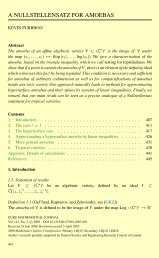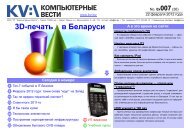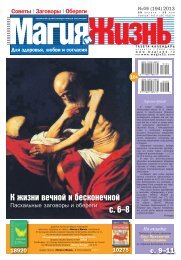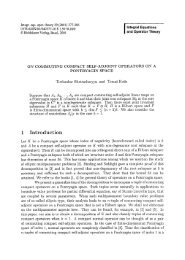computing lives - FTP Directory Listing
computing lives - FTP Directory Listing
computing lives - FTP Directory Listing
You also want an ePaper? Increase the reach of your titles
YUMPU automatically turns print PDFs into web optimized ePapers that Google loves.
A<br />
Computer Previous Page | Contents | Zoom in | Zoom out | Front Cover | Search Issue | Next Page M S BE<br />
aG<br />
F<br />
at lucrative prices, and digital criminals<br />
can be thwarted by digital police.<br />
Some tasks, such as detecting whitewashing,<br />
might even be performed<br />
automatically.<br />
Do we see big brother here? Cash<br />
is anonymous while digital money<br />
can be tracked. For ordinary lawabiding<br />
citizens this should not<br />
be considered a threat as long as<br />
good laws to protect public privacy<br />
remain in place. However,<br />
tax authorities now have a weapon<br />
against the black market economy.<br />
For example, it won’t be so easy to<br />
pay the carpenter, off-the-record,<br />
without cash. Some might view this<br />
as a disadvantage, but we will gain<br />
instead a more fair tax system and<br />
increased state income.<br />
Willing or not, we are moving<br />
slowly but smoothly into a cashfree<br />
society. Today the $100 bill is<br />
the highest denomination in circulation,<br />
with $500, $1,000, $5,000,<br />
and $10,000 bills no longer used.<br />
As inflation takes a percentage of<br />
the real value of the $100 bill every<br />
year, we will soon only have cash<br />
as small change. On the fiip side, it<br />
is interesting to note that the US still<br />
has a one-cent coin. In Norway, the<br />
lowest valued coin is now flfty øre or<br />
approximately nine cents, up from<br />
the one øre that was removed from<br />
circulation in 1972.<br />
The process toward a cash-free<br />
society will be accelerated when the<br />
real costs of using cash are placed on<br />
the individual cash-paying customer,<br />
not shared among all customers. The<br />
growth of true Internet banks, where<br />
all transactions are digital, poses a<br />
severe threat to banks that still have<br />
high cash handling costs. It might<br />
also become more awkward to use<br />
cash. Many countries now require a<br />
national bank notiflcation whenever<br />
large sums are withdrawn or deposited<br />
as cash. We could go further,<br />
perhaps placing a risk tax on the<br />
use of cash to compensate for public<br />
injury and other expenses that follow<br />
from robberies.<br />
RISK<br />
Computing professionals must<br />
be concerned about the risk of getting<br />
into a situation where people<br />
no longer have cash as a backup.<br />
Truthfully, though, we have already<br />
reached this stage. Look into your<br />
wallet and count the bills. Is that<br />
amount sufflcient for food, rent, gas,<br />
and all other expenses? For how long?<br />
While there have been incidents of<br />
credit card and banking system hacking,<br />
computer security is steadily<br />
improving. As with cars, safety only<br />
became an issue late in the technology’s<br />
development. First we had to<br />
solve the “important” problems: getting<br />
the systems to run, making their<br />
services affordable, adding core functionality,<br />
and offering a commercially<br />
aesthetic design.<br />
Most likely, one of the small countries<br />
will flrst take the leap toward<br />
an all-digital economy. As I have<br />
noted, it is easier to get the necessary<br />
infrastructure in place. This<br />
may be done to issue cash cards<br />
to persons who do not qualify for<br />
commercial banking services, or to<br />
implement improved ID systems and<br />
other safeguards. It is also easier to<br />
remove cash from a currency in use<br />
on a national level only, unlike the<br />
dollar and euro, which already have<br />
widespread acceptance.<br />
Given that there are clear<br />
advantages to being the<br />
flrst country to go all digi-<br />
IEEE<br />
THE #1 ARTIFICIAL<br />
INTELLIGENCE<br />
MAGAZINE!<br />
tal, we can expect this development<br />
to happen sooner rather than later.<br />
Crimes will be averted, and national<br />
industry and service providers will<br />
have a home market for technologies<br />
that might be in widespread use in<br />
just a few years.<br />
This transition to a digital economy<br />
can be performed in measured<br />
steps, starting with removing the<br />
high-denomination bills and placing<br />
cash-handling costs on the<br />
shoulders of cash-paying customers.<br />
This process could persist until the<br />
economy is fully digital, or banks<br />
might see a beneflt in keeping smalldenomination<br />
bills and coins in circulation.<br />
As <strong>computing</strong> professionals,<br />
we are privileged to take part in these<br />
dramatic historic developments.<br />
Ultimately, we should consider it an<br />
improvement if bandits replace guns<br />
with keyboards—there will at least<br />
be fewer injuries.<br />
Kai A. Olsen is a professor at Molde<br />
College and the University of Bergen,<br />
and is an adjunct professor at the University<br />
of Pittsburgh. Contact him at<br />
_______________<br />
Kai.Olsen@himolde.no.<br />
Editor: Neville Holmes, School of Computing<br />
and Information Systems, University of<br />
Tasmania; neville.holmes@utas.edu.au<br />
________________<br />
Selected CS articles and columns<br />
are available for free at ____<br />
http://<br />
_________________<br />
ComputingNow.computer.org.<br />
IEEE Intelligent Systems delivers<br />
the latest peer-reviewed research on<br />
all aspects of artificial intelligence,<br />
focusing on practical, fielded applications.<br />
Contributors include leading experts in<br />
<br />
<br />
<br />
Visit us on the Web at<br />
www.computer.org/intelligent<br />
APRIL 2010<br />
A<br />
Computer Previous Page | Contents | Zoom in | Zoom out | Front Cover | Search Issue | Next Page M S BE<br />
aG<br />
F<br />
95

















